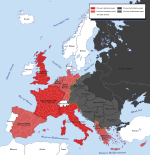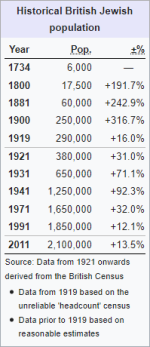- Location
- Sheffield
- Pronouns
- she/her
Political factions of the United Kingdom during the Prorogation Crisis
Parliamentarians
Three hundred and thirty years later, and yet again a Parliament has assembled in Oxford. The members of this Parliament-in-Exile are divided by many things, indeed, there are precious few things which they hold in common. In creed, they range from Corbynistas, to the soft left, to progressives and centrists, to the soft right of the One Nation and Cameronian traditions, all the way to libertarians.
The sole fact which unites the Parliamentarians who now sit in the historic Christ Church Hall is their strident opposition to the government which has assembled itself at Chequers. It was not their expectation that their defiance should spark civil strife. The MPs and Lords who answered the Speaker's call to reassemble Parliament on the 25th of September assumed that upon arriving at Westminster the government would see reason, adhere to the Supreme Court ruling, and reverse the false prorogation. They certainly did not expect to be barred from the Palace, chased from the city by confused police and frenzied Johnsonites, and forced to re-assemble in the City of Dreaming Spires. Yet that is exactly what happened. At the conclusion of the Longest Week of September, the Oxford Parliament finds itself at a crossroads, and many of its MPs have started to lose their nerves.
Speaker Bercow vows to hold them together for, he says, if they will not stand up for British democracy in the face of Johnsonian tyranny, then who will? In the background, Corbyn, McDonnell, Miliband, Watson, Benn, Swinson, Soubry, Clarke, Bebb, Blunt and Boles feud...
Johnsonians
There is great fear and loathing in the Chequers government. The ministers have stuck with the prime minister and his chief advisor, but cracks starting to show. The MPs who have remained loyal to the prime minister can be grouped into the loyal, the ambitious, the cowardly and the gullible. There was great enthusiasm when Boris Johnson made clear he would "fight the courts" and the "liberal elite", but it was not until the 25th and the barring of half of Parliament from Westminster that it sunk in for most how far he was willing to go to do so. The prorogation became more than a parliamentary tool, and instead became a symbol of the centralisation of power in the prime ministerial role; a centralisation which Johnson had no intention to revert. He is the prime minister, and his will be done.
Prime minister Johnson, and erstwhile advisor Dominic Cummings, will struggle on. They are so close, now, and need only finish the job. It remains to be seen whether Gove, Javid, Rees-Mogg, Patel, Raab, and Fox will back them to the hilt, however, when they have their own goals...
Separatists
The winds of change have graced the Home Nations. Sturgeon made the momentous decision to announce a Scottish divorce from the United Kingdom amid the crisis; and with two governments to the south, it was difficult to stop her momentum. She did not expect the Scottish Parliament to narrowly vote against her; and so the nascent Scottish Republic fled to more habitable climes in Glasgow. Sturgeon was, however, mirrored; in Bangor by Price, and in Derry by O'Neill.
Parliamentarians
Three hundred and thirty years later, and yet again a Parliament has assembled in Oxford. The members of this Parliament-in-Exile are divided by many things, indeed, there are precious few things which they hold in common. In creed, they range from Corbynistas, to the soft left, to progressives and centrists, to the soft right of the One Nation and Cameronian traditions, all the way to libertarians.
The sole fact which unites the Parliamentarians who now sit in the historic Christ Church Hall is their strident opposition to the government which has assembled itself at Chequers. It was not their expectation that their defiance should spark civil strife. The MPs and Lords who answered the Speaker's call to reassemble Parliament on the 25th of September assumed that upon arriving at Westminster the government would see reason, adhere to the Supreme Court ruling, and reverse the false prorogation. They certainly did not expect to be barred from the Palace, chased from the city by confused police and frenzied Johnsonites, and forced to re-assemble in the City of Dreaming Spires. Yet that is exactly what happened. At the conclusion of the Longest Week of September, the Oxford Parliament finds itself at a crossroads, and many of its MPs have started to lose their nerves.
Speaker Bercow vows to hold them together for, he says, if they will not stand up for British democracy in the face of Johnsonian tyranny, then who will? In the background, Corbyn, McDonnell, Miliband, Watson, Benn, Swinson, Soubry, Clarke, Bebb, Blunt and Boles feud...
Johnsonians
There is great fear and loathing in the Chequers government. The ministers have stuck with the prime minister and his chief advisor, but cracks starting to show. The MPs who have remained loyal to the prime minister can be grouped into the loyal, the ambitious, the cowardly and the gullible. There was great enthusiasm when Boris Johnson made clear he would "fight the courts" and the "liberal elite", but it was not until the 25th and the barring of half of Parliament from Westminster that it sunk in for most how far he was willing to go to do so. The prorogation became more than a parliamentary tool, and instead became a symbol of the centralisation of power in the prime ministerial role; a centralisation which Johnson had no intention to revert. He is the prime minister, and his will be done.
Prime minister Johnson, and erstwhile advisor Dominic Cummings, will struggle on. They are so close, now, and need only finish the job. It remains to be seen whether Gove, Javid, Rees-Mogg, Patel, Raab, and Fox will back them to the hilt, however, when they have their own goals...
Separatists
The winds of change have graced the Home Nations. Sturgeon made the momentous decision to announce a Scottish divorce from the United Kingdom amid the crisis; and with two governments to the south, it was difficult to stop her momentum. She did not expect the Scottish Parliament to narrowly vote against her; and so the nascent Scottish Republic fled to more habitable climes in Glasgow. Sturgeon was, however, mirrored; in Bangor by Price, and in Derry by O'Neill.
Last edited:



